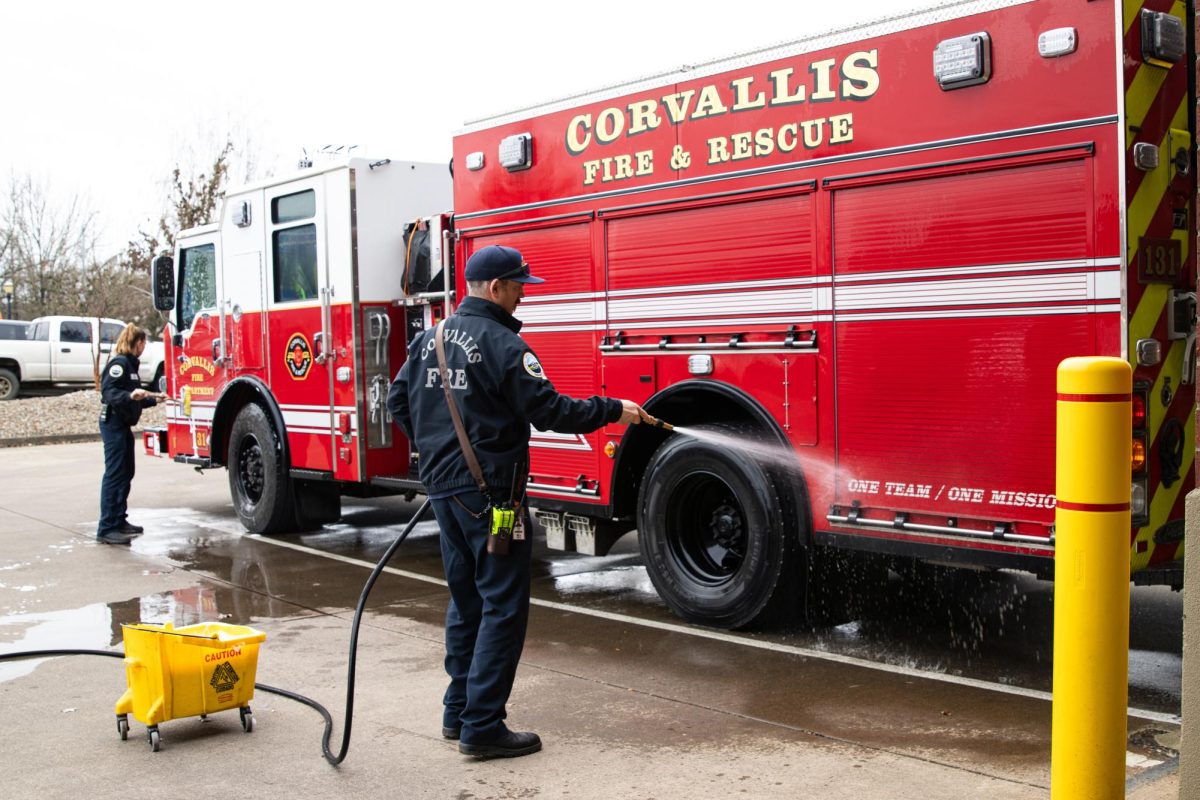Alexander stays: Board of Trustees puts president on probationary period despite public demands for termination
March 17, 2021
Editor’s Note: Content warning—story contains mention of sexual harassment and assault.
Correction: This article previously said the Educator Advancement Council would be hired to review the recommendations of the LSU report and follow up on any outstanding questions, but the Executive & Audit Committee will be the outside consultant hired for the review. This error has been corrected.
During a board meeting on March 17, the Oregon State University Board of Trustees chose to, in a 12 – 2 vote, with Michele Longo Eder and Khawater Hussein dissenting, to place OSU President F. King Alexander on a probationary period until June 1, 2021.
During this time, the board will conduct an evaluation to gather feedback to help inform President Alexander’s success and to address leadership feedback.
The board will also direct the Executive & Audit Committee to hire an outside consultant to review the recommendations of the LSU report and follow up on any outstanding questions. The report they create will be provided to the public.
Furthermore, the board directed Alexander to submit a report reviewing the Louisiana State University report, as well as improve OSU’s policies and procedures, and to address funding needs to Title IX and survivor services.
The report outlines Title IX investigations at LSU, published by law firm Husch Blackwell, which details many alleged cases of misconduct during the time Alexander was president of LSU.
Finally, the board requested that Alexander present a plan to “rebuild trust and relationships and address feedback from the community received.
During the seven-hour-long meeting with approximately 200 viewers of the livestream, students, faculty and community members all took the opportunity to make themselves heard during the emotional public comment portion on the night.
The public comment section was dominated by discussion of the release of the Husch Blackwell report, Alexander’s handling of Title IX violations at LSU, and the culture around a lack of support for survivors of sexual assault and harassment that he is fostering as OSU. There were many comments and questions posed to the board, nearly unanimous in calling for Alexander’s resignation.
“How dare you overlook F. King’s record,” said Tali Ilkovitch, student activist affiliated with Disarm OSU and the We Can Do The Work Campaign. “If you’re not up to the job, we demand you get the hell out of here.”
Ilkovitch also called for the creation of a safe walk program as an alternative to safe ride, explicitly without the involvement of the OSU Police Department.
Isabel Nuñez Pérez, president of the Associated Students of Oregon State University, called for Alexander’s resignation, and read a statement signed by various current and former members of ASOSU, the university’s student government.
“While Alexander served as president of Louisiana State University, he systematically ignored and delayed addressing rampant sexual violence in LSU’s football program and its campus,” Pérez said. “If Alexander knew about the cover up of rampant issues and did not address them, he should resign and have his contract terminated.”
Ann Rasmussen, a member of horticulture faculty, criticized F. King Alexander’s response to the report.
“Being accountable means accepting the consequences of one’s actions, including making restitution when needed,” Rasmussen said. “President Alexander made it clear, in the faculty senate forum, that he has no intention of holding himself accountable.”
Rasmussen cited page 103 of the Husch Blackwell report, which says that LSU students did “not have clear guidance on where or how to submit a report directly to the Title IX Office,” as well as page 110, which describes a “byzantine practice” in regards to how misconduct complaints were handled.
“President Alexander has barely mentioned the survivors of sexual violence, whose lives were affected by his actions. He blamed victims for not reporting,” Rasmussen said. “Here at OSU, he refuses to make a commitment to fund the [Survivor Advocacy Resource Center], which he seems to have been barely aware of prior to this week. If he were taking accountability, I would be able to focus on the job I was hired to do, without worrying about the safety of OSU students and the reputation of the university.”
The board also heard from survivors as well. Erin Rook, the diversity coordinator at OSU-Cascades, revealed that he had been a victim of intimate partner violence while they were in undergrad.
“Like many of my colleagues, I am deeply concerned about the implications of the LSU Title IX report, as well as president Alexander’s responses to the issues that report raised,” Rook said. “The actions included in Title IX’s prohibition of sexual misconduct, which includes domestic and dating violence, stalking, sexual assault and sexual harassment, are violent crimes that can have lasting tramatic impacts on those who survive, and not everyone survives.”
Brenda Tracy, a former OSU student and victims advocate, is a survivor who was assaulted by four athletes, including two members of OSU’s football team in 1998, whose case was mishandled by the university and the police. She went public in 2014, when she shared her story with The Oregonian.
“President [emeritus] Ed Ray immediately issued a public apology to me. He held himself and the institution accountable for a failure that was not his,” Tracy said.
Tracy went on to compare former president Ray and current president Alexander.
“As I listened to Alexander on Monday, I kept thinking ‘How did we get here? How did we go from a man willing to publicly apologize to me, to a man who is actively dodging responsibility and accountability for what may be the largest college sexual assault scandal we’ve ever seen in this country.”
Aurora Sherman, an associate professor in the School of Physiological Science, got emotional while recalling Ray’s apology to Brenda Tracy.
“I remember clearly being in my office, on Nov. 17, 2014, when then-president Ed Ray became the first university president to ever publicly apologize to a sexual assault survivor, Brenda Tracy, whose expirence you’ve already heard today,” Sherman said. “I remember reading president Ray’s letter and weeping while reading words of humility, accountability, commitment for doing better, and above all, truly seeing the pain of Tracy and other sexual assault survivors. I cried out of empathy, because it should not take the experience of sexual assault, to stand in solidarity with survivors.”
Sherman revealed that she is a survivor of gender-based violence that occured during her time as an undergraduate.
“That experience still informs my life,” Sherman said. “As I read then-president Ray’s 2014 letter, I felt part of a community where caring and fairness would be our overarching values. I don’t feel that way anymore. I don’t feel that way because, on Monday, during the faculty senate meeting at which president Alexander was given 90 minutes to take center stage, he failed to demonstrate those values. He did not apologize to the survivors, to whom he is responsible. He did not share a solid plan for action. He expressed surprise that SARC is understaffed. Given that president Alexander has been at the center of sexual assault scandals multiple times before, why wasn’t SARC his very first stop upon arriving at OSU last summer? There has been plenty of time to familiarize himself with resources on this campus and make a plan to correct the problems he now trumpets, in what is obviously a hurried attempt to inform himself well after the news broke about his failures at LSU.”
Sherman pointed out that, other than Ray, there has been one other university president who directly apologized to survivors—Thomas Gallagan, the interim president of LSU, Alexander’s successor—for issues that allegedly arose during Alexander’s tenure.
“President Gallagan thanked survivors for coming forward, noted their courage in doing so,” Sherman said. “In contrast, on Monday president Alexander blamed victims, saying that they failed to report, or didn’t report properly, while completely ignoring the vast pressure on survivors to not report, to wait, to be ashamed of our experience, and not rock the boat.”


















































































![Newspaper clipping from February 25, 1970 in the Daily Barometer showing an article written by Bob Allen, past Barometer Editor. This article was written to spotlight both the student body’s lack of participation with student government at the time in conjunction with their class representatives response. [It’s important to note ASOSU was not structured identically to today’s standards, likely having a president on behalf of each class work together as one entity as opposed to one president representing all classes.]](https://dailybaro.orangemedianetwork.com/wp-content/uploads/2025/03/Screenshot-2025-03-12-1.00.42-PM-e1741811160853.png)
























